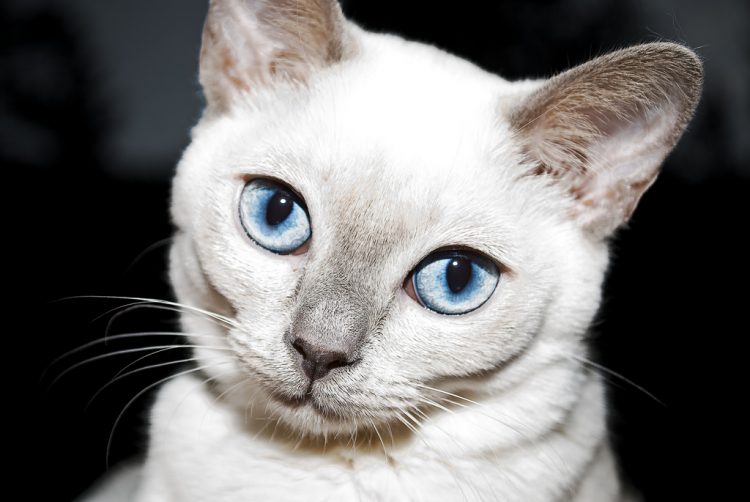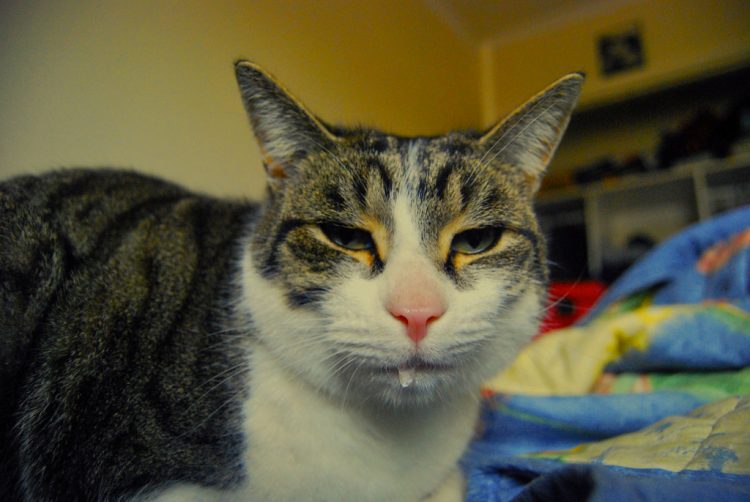
Drool is a small price to pay when you have a little furball to love.
Some of our kitties drool when they get excited by petting or in the car. This type of drool is sporadic and usually not a signal of disease.
But if your cat is drooling continuously, particularly if she’s older, you need to get on this right away.
Feline Oral Squamous Cell Carcinoma
Feline oral squamous cell carcinoma is unfortunately a common cancer in older cats with a mean age of 12–13 years. It is aggressive and accounts for about 80% of the oral tumors we see in felines.
Our only chance of helping an older kitty suffering from this cancer is early detection.
Typical Presentation
I unfortunately diagnose this oral tumor numerable times a year in my older cat population.
Here are the hallmark signs:
1. Odor from the mouth, drool or unusual salivation in an older cat
Many people ignore these early warning signs of devastating and life-threatening oral cancer. People make the mistake that an older cat may just have a smelly mouth.
This is true in many cases. But checking out this “smelly mouth” early gives your cat the best chance of a longer survival time.
2. Difficulty eating or chewing on 1 side of the mouth
A “funny” kind of eating is a big warning sign. Many cats with dental disease, like gingivitis, continue to eat fairly normally. But if your cat has a tumor growing on or under the tongue or in the oral cavity, she may have a hard time chewing.
If there is an oral tumor, the older kitty is usually eating more on 1 side of the mouth than the other, food may be falling out of her mouth or she may look at the food bowl, wanting to eat but can’t.
3. Bloody drool or a swelling on the face
This is clearly not a good sign, and the disease has probably progressed. Many folks think there’s an abscess or oral infection when, sadly, it may be an oral squamous cell carcinoma tumor.

Diagnosis
This can be tricky. These tumors often arise under the tongue or on the floor of the mouth. Certain kitties will not let your vet do a full inspection of the mouth, particularly trying to look deep under the tongue. If your cat does not allow a complete inspection of the mouth, minor sedation may be not only necessary but also essential.
If I can’t see or find an obvious tumor in a physical exam but am worried about a sinister problem in the oral cavity, I recommend a workup including blood work first and sedation or full anesthesia to get a thorough look in the oral cavity, an answer and then a diagnosis.
Treatment
These tumors grow fast and aggressive.
Surgery is the first option. If found early, we try to dissect and remove the tumor with surgical margins as broad as possible. Unfortunately, tumors involving the tongue or base of the tongue can be very difficult to remove without compromising quality of life.
Some people try radiation and chemotherapy with a veterinary oncologist. This may increase life expectancy and a better quality of life for a time, but it is not usually curative.
Was YOUR Pet Food Recalled?
Check Now: Blue Buffalo • Science Diet • Purina • Wellness • 4health • Canine Carry Outs • Friskies • Taste of the Wild • See 200+ more brands…

Learn more about this common disease in cats:

Prognosis
The prognosis for oral squamous cell carcinoma in a cat is poor. With no treatment, we are usually looking at euthanasia within 1–2 months. Depending on the time of diagnosis and possible treatment, we may be looking at 6 months. But some of my patients come in with such advanced disease that euthanasia might be appropriate at the time of presentation.
This is my personal feeling about this upsetting cancer: Too many people neglect the early signs in their older kitties. This is not their fault, just a reality. Many of my geriatric feline patients inflicted with this tumor can’t eat and have significant weight loss.
Of course, I hate to give the devastating news, but I also feel a compassionate responsibility to these cats. Quality of life is most important with incurable disease. I don’t want these cats to suffer. With all of our fancy surgery, chemo and radiation, if we still can’t give people a good prognosis, I don’t think a lot of this treatment is in the interest of the patient.
If your vet diagnoses this upsetting oral tumor in a later stage, have an honest conversation. In my opinion, depending on the extent of the tumor, pain medication, liquid foods and hospice care may be the best route.
This pet health content was written by a veterinarian, Dr. Debora Lichtenberg, VMD. It was reviewed for accuracy by Dr. Pippa Elliott, BVMS, MRCVS, and was last updated Oct. 11, 2018.



